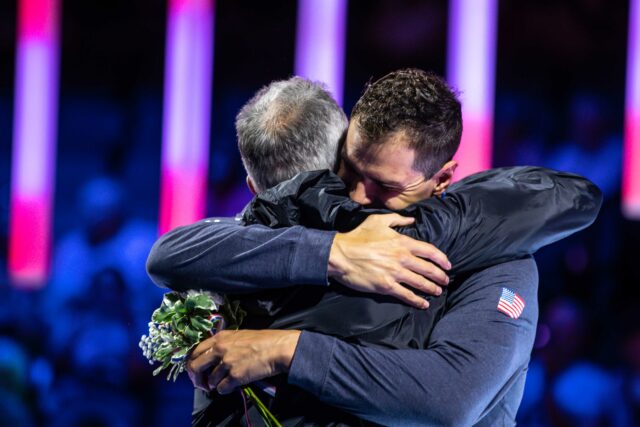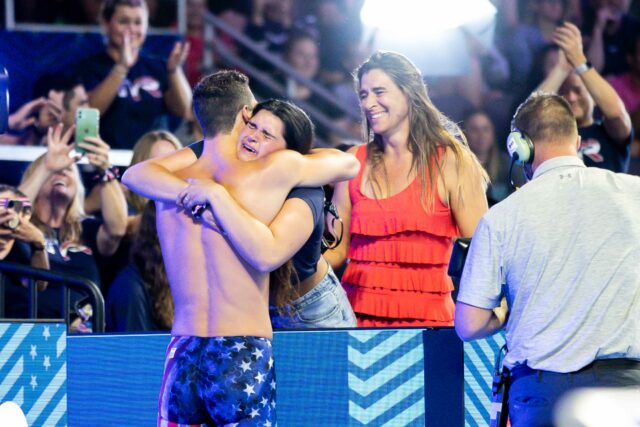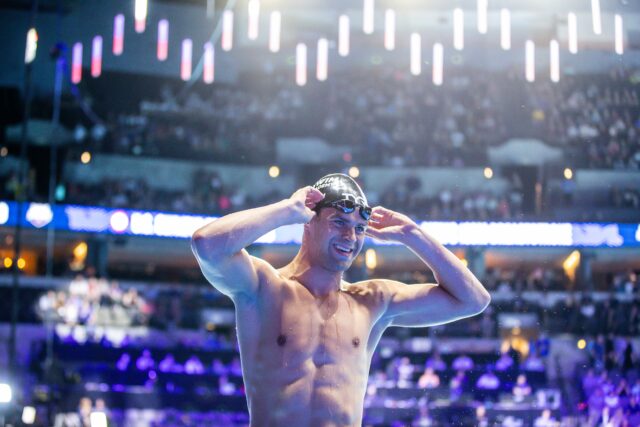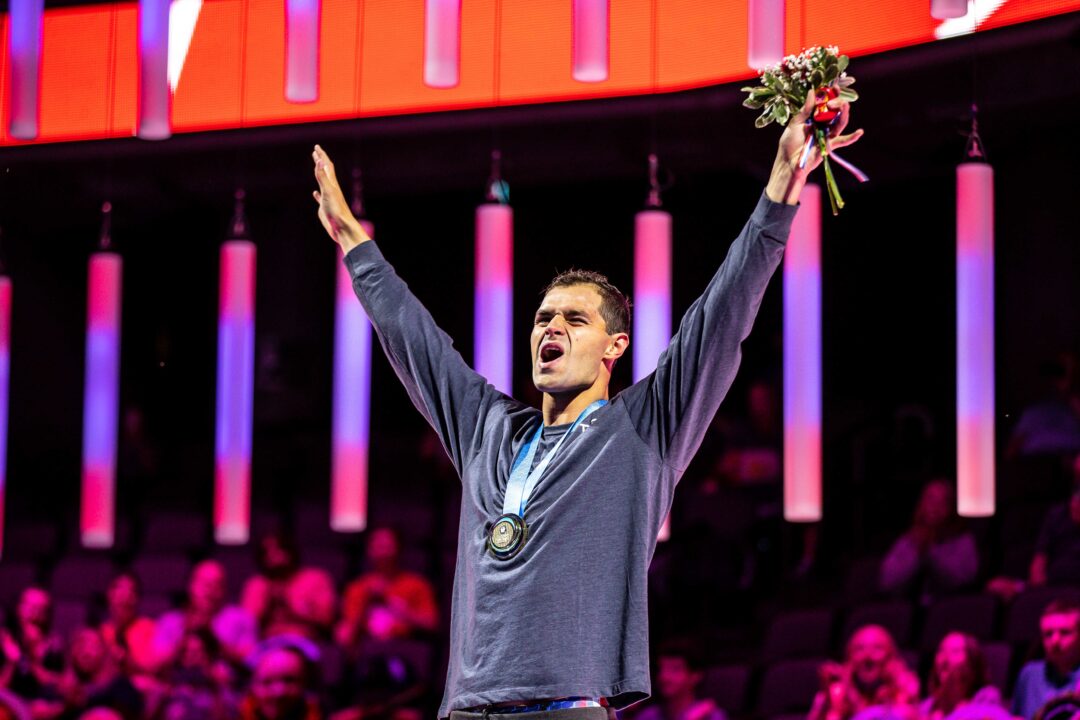In a sport where the vast majority of athletes follow a similar path, Michael Andrew took the road less travelled.
Rather than swim in a big club, go to college and then pursue a potential career as a professional swimmer, Andrew signed his first sponsorship deal at the age of 14.
But going pro so early in his career wasn’t the only thing Andrew did against the grain—he trained different than everyone else, popularizing Ultra Short Race Pace Training (USRPT), and he did so with his family acting as his “team”, with father Peter Andrew the head coach.
Examples of an athlete being coached by a parent all the way to an Olympic team come few and far between, especially in swimming.
Andrew Gemmell, a 2012 U.S. Olympian in the men’s 1500 freestyle, was coached in part by his father Bruce in the lead-up to the Games, though he was also attending the University of Georgia during the school year.
Ryan Lochte was coached by his father, Steve, up until two years before he made the U.S. Olympic team for the first time in 2004.
But the way the Andrew’s have done things has been truly one of a kind.
And amidst all of the criticism, doubts and people offering their two cents on what he should change in his approach, Andrew is on the U.S. Olympic team.
After breaking the American Record in both the prelims and semi-finals of the men’s 100 breaststroke, the 22-year-old won an incredibly tight final by one one-hundredth of a second over Andrew Wilson in a time of 58.73. Wilson (58.74) picked up the second Olympic spot by .06 over Nic Fink (58.80).
“It’s hard to put into words,” Andrew told SwimSwam on making his first Olympic team, approximately 16 hours removed from the achievement.
“It’s one of those moments we’ve been working for. At least this last five years, it’s kind of been in the back of my mind, and these last five months it’s been so front and center, with the focus of one day making that Olympic team.
“So to have that moment be over, and kind of come to fruition is just…just a complete dream.”

Michael Andrew (photo: Jack Spitser)
But the road to these 2021 Olympic Trials in Omaha, and ultimately standing atop the podium with an Olympic spot locked in, was not an easy one for Team Andrew. Both in and out of the pool.
Confidence In Their Approach
Success came fast and furious for Andrew as a youngster, breaking more than 100 National Age Group Records from ages 10 to 18.
But as he got older and the expectations grew along with him, success did not come in a linear fashion.
Andrew’s best finish at the 2016 Olympic Trials (at the age of 17) was fourth. Then his highest finish in an Olympic event at the 2017 World Championship Trials was fifth.
2018 was a breakout year—four U.S. Nationals titles, followed by a gold medal victory in the 50 freestyle at the Pan Pacific Championships. But that was followed, by his own standards, a “pretty poor showing” at the 2019 World Championships.
Amid the ups and downs, Team Andrew remained steadfast in what they were doing, adamant that it would eventually pay off.
“There’s always going to be hard times,” said Michael. “I think it’s important as an athlete to understand this, it’s something I’ve learned over the years: you can’t have the mountaintops without going through the valleys.
“And it’s through the valleys that comes growth and the lessons that can be learned, but it’s the mountaintops that you can celebrate and enjoy the view because of the terrain that you had to walk through. And that’s kind of how I view my career is a lot of highs and lows, and it’s the lows that make the highs feels as high as they are.”

Michael Andrew and Peter Andrew (photo: Jack Spitser)
Managing The Family/Coach Balance
When asked how he and his father have managed their coach/swimmer relationship amidst the father/son dynamic (along with his mother, Tina, and sister, Michaela), Andrew pointed to this year specifically and described how they hit a bit of a ‘reset’ point in the way they go about things.
And it all comes back to a word that Andrew has used numerous times in interviews this week: purpose.
“It’s been really interesting in the recent season to see just our family dynamic,” he said. “As a team we’ve always worked so well together, but we came to a, not a fork in the road, but an opportunity to kind of reassess where we were and what our purpose was as a team.
“Things were starting to become strained. Kind of realizing that swimming isn’t—as much as it’s our primary focus and what we’re doing as a team—it’s not what really matters. What really matters is us operating as a family unit and loving one another and being able to just keep the perspective healthy.”
Andrew feels that the tight-knit nature his family has, and the ability to speak openly with one another, allows them to mesh together as a unit better than he would with someone who was solely a coach.

Michael Andrew with sister Michaela and mother Tina (photo: Jack Spitser)
“And I think that’s been really cool, as through communication and working together for my whole career we’ve been able to figure out what’s the best path going forward. And that’s something I feel like, you wouldn’t ever be able to replicate, just with a coach, there’s such a bond between my dad and myself and my mom, and the fact that we’re all so involved in this journey, that there’s kind of — it’s take a village, but we need boundaries.
“Much like we have highs and lows in the performance, it’s being able to navigate those hectic times and the relationships that makes it all worthwhile.”
Making The Olympic Dream A Reality
Andrew can remember the first time thoughts of becoming an Olympian popped in his head. It was 2008, when Michael Phelps, who Andrew has been in contact with this week, went on his record-breaking run of eight gold medals at the Beijing Games.
“I remember watching the Olympics in the basement sitting on these giant bean bags,” said Andrew. “Just thinking to myself: ‘man, that looks pretty awesome’. To be able to walk out in an arena like that and to swim in a pool like that, it wasn’t something that I held on to so tightly in those early stages of my career, but I think that was the first time that I though – ‘Hmm, that’d be pretty sick.’
“And then by the time I was 10 I started competing really seriously and breaking National Records, and that’s when we started to see, ‘Hey this could be a reality one day’. And fast forward a decade later, and here we are.”
But let’s rewind to those 2019 World Championships. Andrew made history by making the final in all four 50-meter races, becoming the first swimmer ever to do so, but he left the meet extremely disappointed.
“I wasn’t very happy with the results,” he said. “It was that meet that I realized, ‘Man I feel like there’s a lot of wasted potential and I need to be focusing on the 200 IM and building some endurance there’.”
So that’s what he’s done. And that shift to a more 200 IM-based focus, Andrew believes, has paid dividends in his 100m events.
“The training we’ve now put into that 200 IM and being prepared for that race has showed itself in my 100 breaststroke, 100 fly, 100 back, and the other races because now I have the endurance to back the speed.
“And that was a big thing for me, which is interesting because when I was younger I swam everything and was good at it, but I never stuck with anything over a 200 because I was afraid of the pain and what came with that, and obviously I didn’t really like training longer for those events. And now I understand the importance of almost over-preparing for the 100s so that you can finish that much better.”

Michael Andrew (photo: Jack Spitser)
Andrew’s job in Omaha is far from done. The 200 IM, 100 butterfly and 50 freestyle—all events where he has a great chance to finish in the top two—remain on his schedule. But having that Olympic spot locked up, and doing so alongside his family, has already made the experience an incredible one.
“There’s a new opportunity and a new challenge to work towards now that we get ready for Tokyo, so just to say that it’s a huge blessing and to be able to do it with my family, my team is that much cooler.”

What the heck kind of Andrew family drama keeps being alluded to in these interviews?
Don’t think I’ve ever heard an elite swimmer say after a race that he “doesn’t deserve this”. Struck me as pretty strange
I enjoyed the article. Nice work! I’d also be interested in reading the Reid Carlson version. 😉
Let me be clear, MA has departed from a strict application of ‘THE’ USRPT some time ago. He and his father had (finally) come to the realization that by doing USRPT only was not leading to the desired outcome. It is clear that in the last few months (6-9 is my educated guestimate) NA has incorporated some of more ‘traditional’ (if you like) lactate-tolerance type of sets in his training. It has probably become 70% USRPT + 30% more traditional (and that is also how I would coach such an, physically gifted and disciplined, athlete). Besides that, we have all seen that he had done quite some work in the gym, which, according to the strict USRPT, should be unnecessary.… Read more »
Andrew said on an Instagram story that he dropped his weights routine because he wasn’t seeing any benefits from it
I don’t think this is completely untrue. The 200 IM sets are targeted at building endurance for his 100s as well as his 200 IM. He doesn’t lift weights but he does bodyweight exercises.
MA did/does not need much extra endurance, as he had the benefit of having that easy speed over ca. 75m in each of 4 strokes. If I’m not mistaken, as age-grouper he swam IM’s (400 including) quite/very well. I feel that they had always known that the moment will come to adjust the training the way I described above. It’s not a rocket science. I am happy for them that they’d gotten this extra year to properly prepare (even if MA does not qualify in any other event than 100 BR, the benefits will remain). P.S. One does not buy a complete full-functional gym for home-use to just do bodyweight exercises. Besides, to get benefit from (moderate) weight-training a novice… Read more »
Dropped the keto phase too from what I can tell. Was never a good idea anyways
I have never heard him saying that they are doing anything but USRPT, and he has also stopped lifting
Everyone’s training changed due to Covid and pool closures.
I heard he stopped swimming in practice altogether. He just did a lot of mental visualization.
MA is the ULTIMATE performer and champion. No one had more pressure going into trials than he. He has stood up and been honest, hardworking, respectful and humble. He deserves this.
USRPT is way harder than “regular”training. I’ve done both as a D1 AA and Olympic trials qualifier. Mad respect, congratulations and kudos to him and his family.
Agreed. What people don’t understand is USRPT can be as hard as you make it. There will always be kids who slack and fail 3 times right away. USRPT is not the training for swimmers like that. It works the best for the hardest workers.
Most swimmers go to college since they can’t make money out of the sport though many of the elites did 2 years and finished college later. In fact few swimmers are interested in trades. Some trades pay as well as becoming a grade school teacher. Lots of swimmers do become teachers and don’t make more money than many electricians in their area with a trade education.
Would love to see some stats on these claims.
You don’t believe electricians make more than teachers?
Everyone loves to criticize MA for usrpt, “it’s too easy”, “it won’t help”, etc. but they also refuse to do those type of race pace sets because “it’s too hard”, “I feel I need more yardage” etc.
I wonder what the future holds in terms of coaches and teams doing usrpt or at least less yardage. It’s seemed to help a lot of kids during the pandemic.
Two sides to every argument (and both are probably right). I’m happy for Michael. That being said, there is a real concern with US Swimming at the 400 level and up. A cookie cutter approach usually doesn’t work for all swimmers, so while USRPT may work for some, aerobic will work for others. It’s up to coaches to determine how to best train their athletes.
Yes, I don’t think MA’s skill set trending towards 400 and up, so it made sense for him to pursue this type of training. I don’t think the Andrews have advocated for this training to be used universally.
According to the science usrpt should work just as well for 400 and up, any concerns are based on nothing
17 Olympic swimming events (excluding Marathon). 13 of them are under 400. Even more at Worlds. Concern should not be be there. Concern should be: What is the best way to train for 200m and under. Concern for 400+ and widely adopted longer distance training is statistically hurting swimmers and their international success where most medals are won. I hope the old guard slowly moves towards USRPT type training and stops talking about how 25 years ago they would swim 8miles per practice. Time to adapt and MA is leading the way.
Thanks for this article. I found him and his family to be a bit annoying at first with him going pro so early, the product placements, etc., but I have grown to respect them and their unorthodox approach. While people may criticize USRPT, it’s definitely not an easy training method. MA has worked his butt off and deserves to be an Olympian.